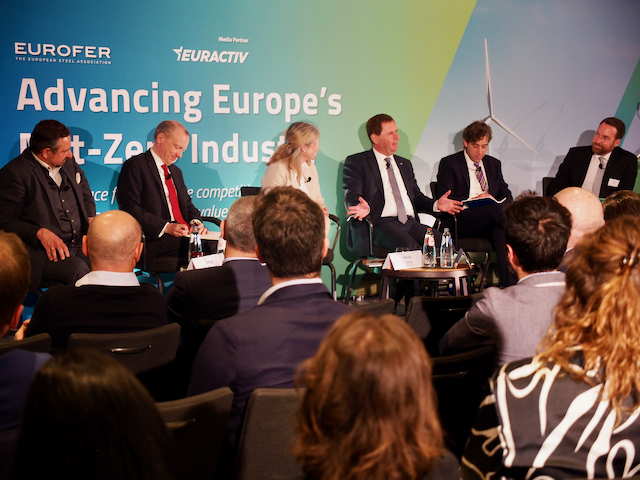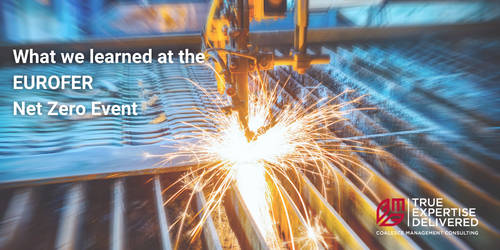Last week Coalesce Management Consulting’s steel experts, Jonas Korsgaard Lang and Cain Van Heyningen, attended the European Steel Association (EUROFER)’s annual conference in Brussels, this year titled “Advancing Europe’s Net-Zero Industry: How The Race For Fossil-Free Competitive Energy Will Reshape Manufacturing Value-Chains.”

Image via EUROFER
As specialists in delivering net-zero consultancy services across the Process industry, our experts work with the leading businesses in advancing this sector, so this conference was an excellent opportunity to discuss our own contributions as well as learn more about the ambitious plans of manufacturers across the EU.
With net-zero targets setting the standard and next-generation energy developments, all relying on the steel industry, this conference and the discussions going on around it represent a critical moment for clean tech infrastructure.
Our team enjoyed some very productive conversations with other leaders in this space and came away with a few key insights:
Green steel is a key growth market for the energy transition
Steel is an essential material for the energy transition as a core component within wind turbines, solar panels, hydrogen plants, electric vehicles and next-generation constructions.
Every megawatt of solar power generated requires between 35 and 45 tons of steel from the manufacturing process.
Every megawatt of wind power requires up to 120 tons of steel. Most wind turbines are actually 70% steel.
It’s thought that the renewable energy sector will require over 74 million tons of steel during the next eight years to accomplish plans under the Net Zero Act.
Clearly, there is no danger of falling demand for steel, which is why resolving the emissions created by the manufacturing process is vital. Currently, over 60 green steel projects are underway across Europe, and it’s estimated that the market will grow at a CAGR of 75.24% from 2023 to 2028.
To put that in context, the European green steel market was valued at US$47.36 million last year. By 2028 it’s expected to reach US$1272.06 million.
The immense opportunity here and its necessity to the energy transition is why we’re so committed to supporting the green steel process industry through our consulting products. We already deliver skilled, specialist consultants to major European projects, and we’re consistently adding more experts to our workbench to keep up with the incoming demand for skills.
Circular economy principles are the key to emissions reduction
In his opening remarks to the conference, Eurofer President and CEO of Celsa Group, Francesc Rubiralta Rubio, called steel “the most important recycling industry in Europe.”
Not only is steel vital to the energy industry, it’s also one of the few materials that is one hundred per cent recyclable.
With 88 million tons of steel scrapped every year, embracing circular economy principles can be key to achieving green deal objectives. If this much scrap steel could be recycled every year, it would reduce as much CO2 as is currently produced by 40% of EU households.
Time is of the essence
The conference closed with a warning from Axel Eggert, EUROFER’s Director General, about the need for policymakers to speed up legislation surrounding the industry.
Despite all the positives and potential for massive growth within the energy transition, there are still difficulties related to increased material costs and the need for more renewable energy sources in plants. Currently, the renewable energy supply is not yet at the scale necessary to support mills' plans to decarbonise.
And with the phase-out of the EU Emissions Trading System, carbon prices in the EU are forecasted at €100/t of CO2 equivalent or higher by 2030.
"This means we will either be decarbonised by 2030 or gone," said Geert Van Poelvoorde, chief executive of ArcelorMittal Europe
It’s an issue of timing and one that can only be resolved by legislators. However, we believe the need for clean energy and the constant, growing calls for implementing net zero incentives will push the issue and ultimately strengthen the steel business.
True Expertise Delivered
Our experts deliver net-zero solutions for steel process businesses across Europe. We have a vast workbench of international specialists at every level, meaning we’re able to quickly deploy skilled professionals to provide any solutions.
We’re committed to making positive change across the industry, including setting our own Net-Zero by 2028 commitments.
Get in touch with Jonas, Cain and the European steel team to learn more about how we can help you deliver on your process goals.


